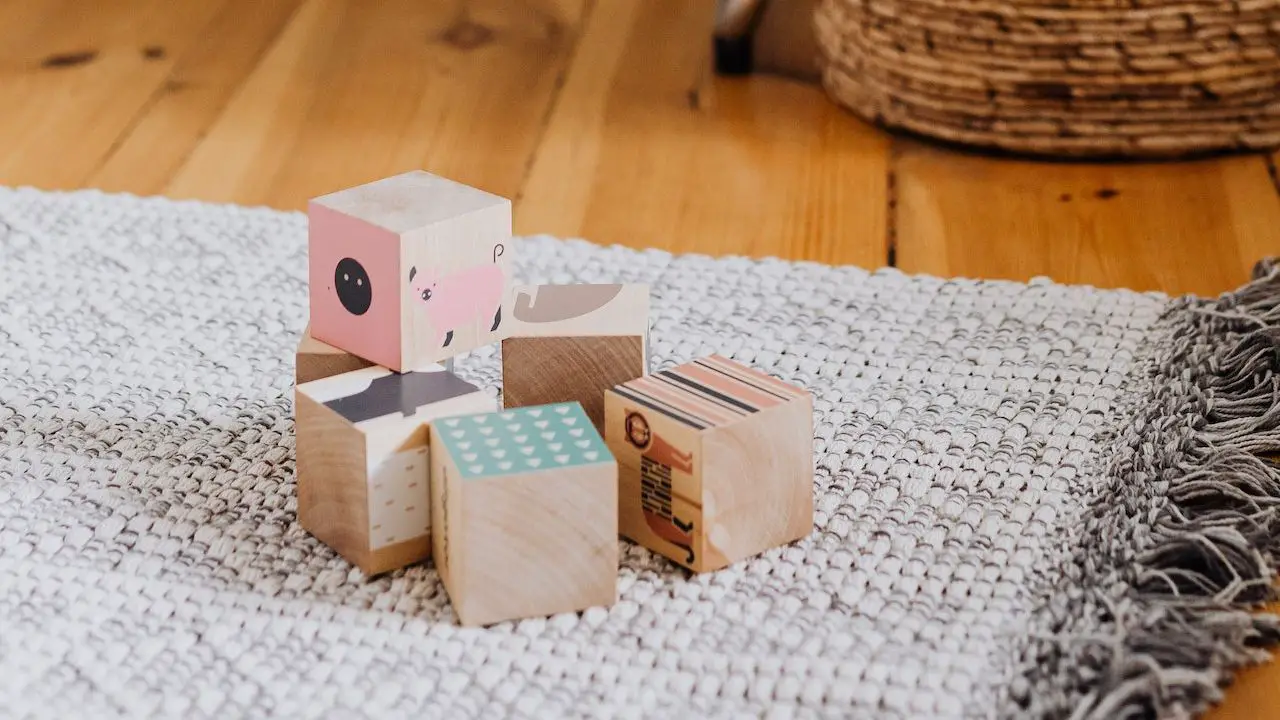
9 Key Elements To Create A Montessori Nursery
A simple guide to creating the perfect nursery room

*Disclosure: I only recommend products I would use myself and all opinions expressed here are our own. This post may contain affiliate links that at no additional cost to you, I may earn a small commission. Thank you or your support!
Share this post
Creating a Montessori nursery room can be a rewarding experience for both parents and newborns. By providing a carefully planned environment filled with purposeful materials and furniture, you can encourage self-directed learning and promote independence, creativity, and critical thinking skills in your child.
In this article, you will learn about the key elements of a Montessori nursery room, including the materials and furniture needed, the benefits of the Montessori approach, and practical ideas to create the right Montessori room setup.
Whether you’re a parent, caregiver, or educator, this guide will help you create a Montessori-inspired nursery room that meets your needs and enhances your child’s development.
Please note that this article is about creating a nursery room for a newborn. If you’d like to know how to set up a Montessori room for infants and toddlers, you can check out this article.
Let’s get started!
What is a Montessori nursery room?
A Montessori nursery room is a childcare environment based on the educational philosophy of Maria Montessori, which emphasizes self-directed learning through hands-on exploration and discovery. In a Montessori nursery room, children are provided with carefully chosen materials and furniture that are accessible to them and allow for open-ended play and investigation.
Setting up a Montessori nursery room can provide numerous benefits for your child’s development. By allowing them to engage in self-directed learning and exploration, you can help foster their independence, creativity, and critical thinking skills.
Additionally, the Montessori approach has been shown to help children develop better problem-solving abilities, stronger concentration skills, and improved socialization skills.
Creating a Montessori nursery room can also be a fun and rewarding experience for parents and caregivers. By carefully selecting materials and furniture that meet the needs of your child, you can create a space that supports their growth and development and provides them with a safe and nurturing environment.
Consider the Montessori principles
The Montessori principles are a set of educational values and teaching methods inspired by the philosophy of Maria Montessori. These principles include:
Respect for the child: Recognizing the unique qualities and abilities of each child and treating them with respect and dignity.
Prepared environment: Creating a physical environment that is well-ordered, attractive, and promotes independence and learning.
Sensorial development: Encouraging the child’s sensory development through hands-on exploration and manipulation of materials.
Freedom within limits: Providing children with freedom of choice and movement within a safe and structured environment.
Absorbent mind: Recognizing that children have an innate ability to absorb information from their environment and use this knowledge to guide their learning.
Order and repetition: Providing a well-ordered environment that emphasizes repetition and patterns, which helps children understand cause-and-effect relationships.
Normalization: Fostering a sense of belonging and community, and encouraging children to develop positive social skills and behaviors.
By incorporating these principles into your Montessori nursery room, you can create an environment that supports your child’s natural development and enhances their learning experiences. By providing a well-prepared, well-ordered, and attractive environment, you can encourage your child to explore and discover, and help them develop a love of learning.
Montessori nursery benefits for newborns
The right Montessori room setup can provide numerous benefits for newborns, including:
Stimulation of the senses: Montessori materials and furniture are designed to stimulate a newborn’s senses, helping to develop their cognitive, motor, and sensory skills.
Encouragement of independent exploration: By providing a safe and nurturing environment that encourages exploration, a Montessori nursery room can help newborns develop a sense of self-directedness and independence.
Fostering of bonding: By creating a warm and welcoming environment that promotes physical and emotional security, a Montessori nursery room can help foster strong bonds between parents and their newborn.
Nurturing of natural development: The Montessori approach recognizes that every child develops at their own pace and provides a supportive environment that nurtures this natural development.
Establishment of routines: The Montessori approach emphasizes routines and repetition, which can help establish a sense of structure and stability in a newborn’s life.
Tip for creating the perfect Montessori nursery
Keep things simple! Creating a Montessori nursery room can be a rewarding experience for both parents and children. However, it is important to remember that the focus should be on the educational philosophy and principles, rather than aesthetics.
A well-prepared Montessori nursery room should prioritize functionality and simplicity over appearance, as this creates an environment that is conducive to learning and exploration.
The Montessori philosophy emphasizes respect for the child and provides a prepared environment that is well-ordered, and attractive and promotes independence and learning. To follow this philosophy, it is important to keep things simple and avoid clutter and distractions.
This can be achieved by selecting Montessori materials and furniture that are functional, durable, and easy to use, and arranging them in a way that is accessible and inviting to the child.
When setting up a Montessori nursery room, it is also important to keep the child’s age and developmental stage in mind. For newborns and very young children, simple materials such as mobiles, mirrors, and soft toys can help stimulate their senses and encourage independent exploration.
As children grow and develop, materials can be introduced that are designed to help with specific skill development, such as stacking blocks, puzzle boards, and sorting games. Read more on how to create a Montessori environment at home.
In addition to materials and furniture, it is also important to consider the overall layout of the nursery room. A simple, well-organized space that allows for easy access to materials and furniture can help promote independence and self-directed learning.
This can be achieved by keeping storage areas tidy and accessible and arranging furniture in a way that allows for free movement and exploration.
Finally, it is important to keep in mind that the Montessori philosophy emphasizes the process of learning, rather than the end result. By keeping things simple and focusing on the educational principles, you can create a Montessori nursery room that provides your child with a supportive and nurturing environment that encourages their natural development and enhances their learning experiences.
Nine essential Montessori nursery room items
Below are some must-haves Montessori furniture and items to support your child’s growth in a Montessori room setup for newborns.
A Montessori floor bed provides numerous benefits for young children. By sleeping on a low, open bed that is easily accessible, children can develop a sense of independence and learn to be responsible for their own sleeping habits.
A Montessori floor bed also allows children to have a safe and comfortable place to rest, which can help support their overall health and well-being. Additionally, sleeping on a floor bed can help prevent falls and injuries, as well as promote a sense of security and comfort.
I published an article on the best Montessori floor beds, so go ahead and check it out so you can start this rewarding process.
Low shelves are an essential component of a Montessori nursery room. By keeping materials and toys within easy reach, low shelves promote independence and self-directed learning.
Children are able to choose their own activities and materials, which can help build their confidence and develop their sense of self. Low shelves also help to keep the room organized and tidy, and provide a safe and accessible storage solution for toys and materials.
A Montessori mirror can provide numerous benefits for young children. Mirrors are an important tool for promoting self-awareness and helping children develop their sense of self. By observing themselves in the mirror, children can learn about their own physical characteristics and movements, and develop their sense of self-identity.
Additionally, mirrors can be used to support early learning activities, such as object recognition and language development.
A Montessori pull-up bar is a versatile tool that can provide numerous benefits for young children. The bar helps to develop strength and coordination, and provides children with a safe and fun way to practice gross motor skills.
By using a pull-up bar, children can develop their gross motor skills, such as climbing, hanging, and jumping, which can help to support their overall health and well-being. Additionally, a pull-up bar can provide children with a sense of accomplishment and help build their confidence.
A dedicated play area is an important component of a Montessori nursery room. By providing a designated space for play, children can develop a sense of independence and learn to be responsible for their own play habits.
A well-prepared play area should be free from distractions and clutter, and should provide a safe and comfortable space for children to explore, imagine, and play.
A play area can also provide a space for children to develop their social skills, as they learn to share materials, take turns, and engage in cooperative play.
Our favorite time for a newborn and infant! Topponcino is a cushion or small mat that is used in Montessori environments to provide a safe and comfortable space for infants and young children. Topponcino can be used for a variety of activities, such as tummy time, crawling, and independent play.
The soft and supportive surface of Topponcino helps to promote comfort and security, while also helping to develop gross motor skills, such as balance and coordination.
Additionally, Topponcino can help support the emotional well-being of young children by providing them with a safe and comfortable space for exploration and play.
Montessori mobiles are a key tool for promoting sensory development in young children. Mobiles provide a visually stimulating experience that can help stimulate the senses, including sight, hearing, and touch.
By observing the movement of the mobiles, children can develop their sense of cause and effect, and learn about spatial relationships and movement.
Montessori mobiles can also help to develop concentration and focus, and provide a calming and soothing experience for infants and young children.
Having a dedicated feeding area, such as a nursery chair, in a Montessori nursery room is important for several reasons. It provides a designated space for feeding, which can help to promote a sense of routine and structure for both the child and the parent.
A comfortable and supportive nursery chair can help to support a healthy feeding posture, and can also provide a comfortable space for the parent to bond with the child.
Black and white cards can be an effective tool for promoting visual development in newborns. The high contrast between black and white makes the cards visually stimulating for young infants, who are often more attracted to high-contrast images at this stage.
By exposing newborns to black and white cards, they can develop their visual tracking skills, which is the ability to follow an object with their eyes.
This type of stimulation can also help to promote the maturation of the visual cortex, which is the part of the brain responsible for processing visual information.
Final thoughts on setting up a Montessori nursery room
When creating a Montessori nursery room, it is important to prioritize simplicity, functionality, and the Montessori principles.
By keeping things simple and focusing on the child’s needs, you can create a space that supports their growth and development and provides them with a warm and nurturing environment that encourages their love of learning.

Hello, I am Leslie. I am on a mission to help you support the growth and development of your child. With the right tools and proper guidance, you can navigate parenthood with confidence and assertion! My goal is to equip you with knowledge to help you construct a strong foundation for your child’s life.
Suggested articles
You May Also Like

Will Ceiling Fan Make Newborn Sick? Things To Know
No, a ceiling fan will not make your newborn sick. In fact, it helps maintain a comfortable and cool environment and lowers the risk of SIDS because it improves air circulation.

6 Types Of Cloth Diapers: Comparison, Cost, Pros And Cons
The six types of cloth diapers are All-in-One (AIO), All-in-Two (AI2), Pocket, Prefold, Fitted, and Flat. We share everything you need to know about cloth diapers.

A Complete Guide to The Sensitive Periods Of Development In Montessori
Montessori Sensitive periods are specific windows of time during a child’s development when they are particularly receptive to learning certain skills or acquiring certain knowledge.












